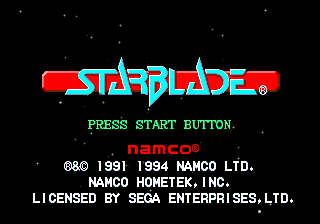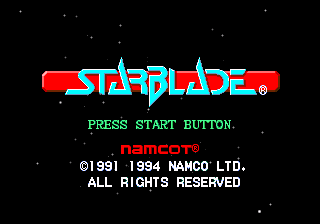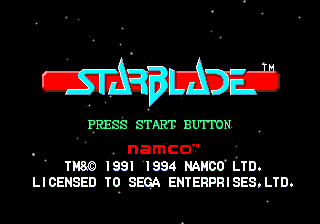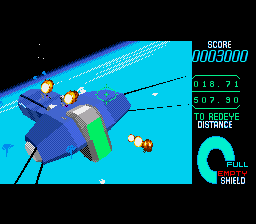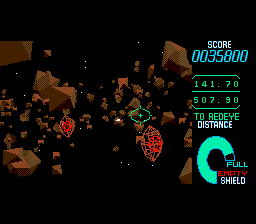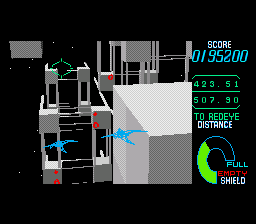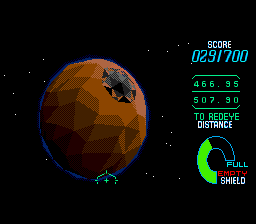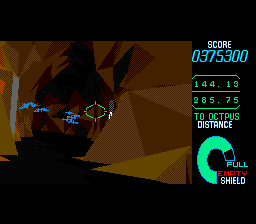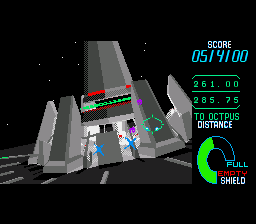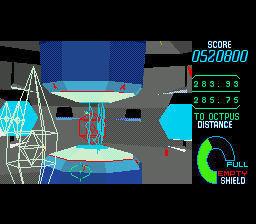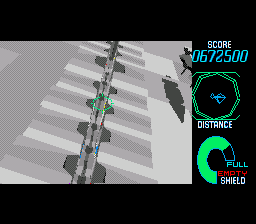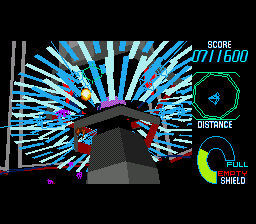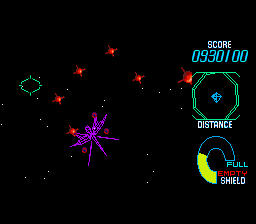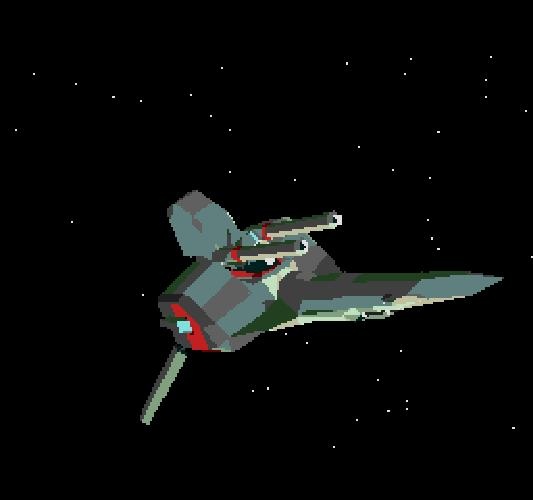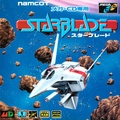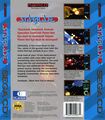Difference between revisions of "StarBlade"
From Sega Retro
m (→Physical scans) |
Hyperspeed34 (talk | contribs) |
||
| Line 6: | Line 6: | ||
| tab2=NTSC-J | | tab2=NTSC-J | ||
| tab3=PAL | | tab3=PAL | ||
| − | | publisher={{company|[[Namco]]|region=Japan}}, {{company|[[Namco Hometek]]|region=US}}, {{company|[[Sega]]|region=Europe}} | + | | publisher={{company|[[Namco]]|region=Japan}}, {{company|[[Namco Hometek]]|region=US}}, {{company|[[Sega Europe]]|region=Europe}} |
| developer=[[Technosoft]]{{ref|https://web.archive.org/web/20180803202340/https://twitter.com/ummo_chan/status/924644482892554240}} | | developer=[[Technosoft]]{{ref|https://web.archive.org/web/20180803202340/https://twitter.com/ummo_chan/status/924644482892554240}} | ||
| system=[[Sega Mega-CD]] | | system=[[Sega Mega-CD]] | ||
| Line 33: | Line 33: | ||
| otherformats={{NonSega|Arcade|3DO|PS}} | | otherformats={{NonSega|Arcade|3DO|PS}} | ||
}} | }} | ||
| − | '''''{{PAGENAME}}''''' (スターブレード) is a [[Sega Mega-CD]] rail shooter developed by [[Technosoft]] and published by [[Namco]]. A port of the publisher's titular 1991 arcade game ''[[wikipedia:StarBlade|StarBlade]]'', it was first released in Japan and the United States in October 1994{{ref|https://web.archive.org/web/20190610175627/https://sega.jp/fb/segahard/mcd/soft_licensee.html}}, and was later brought to Europe by | + | '''''{{PAGENAME}}''''' (スターブレード) is a [[Sega Mega-CD]] rail shooter developed by [[Technosoft]] and published by [[Namco]]. A port of the publisher's titular 1991 arcade game ''[[wikipedia:StarBlade|StarBlade]]'', it was first released in Japan and the United States in October 1994{{ref|https://web.archive.org/web/20190610175627/https://sega.jp/fb/segahard/mcd/soft_licensee.html}}, and was later brought to Europe by Sega the following December.{{magref|segamaguk|13|92}} |
The original arcade game was notable for its use of real-time rendered 3D polygon graphics. The Mega-CD port has a reduced screen size and draws its backgrounds in real-time using pre-calculated coordinates. Since the game is on rails, each element appears in the same spot on every playthrough, which significantly alleviates the processing load.{{ref|https://gdri.smspower.org/wiki/index.php/Blog:Starblade:_The_Home_Ports}}{{ref|https://www.sega-16.com/forum/showthread.php?20809-So-like-is-Star-Blade-does-use-teh-FMV-for-its-polygons-or-not-yo}} Enemies are rendered as wireframe graphics. This is in contrast to the other ports of the game for the [[3DO]] and [[PlayStation]] (as well as similar-looking games for the Mega-CD, such as ''[[Silpheed]]''), which display the background as pre-rendered [[full-motion video]] but have fully polygonal enemies. | The original arcade game was notable for its use of real-time rendered 3D polygon graphics. The Mega-CD port has a reduced screen size and draws its backgrounds in real-time using pre-calculated coordinates. Since the game is on rails, each element appears in the same spot on every playthrough, which significantly alleviates the processing load.{{ref|https://gdri.smspower.org/wiki/index.php/Blog:Starblade:_The_Home_Ports}}{{ref|https://www.sega-16.com/forum/showthread.php?20809-So-like-is-Star-Blade-does-use-teh-FMV-for-its-polygons-or-not-yo}} Enemies are rendered as wireframe graphics. This is in contrast to the other ports of the game for the [[3DO]] and [[PlayStation]] (as well as similar-looking games for the Mega-CD, such as ''[[Silpheed]]''), which display the background as pre-rendered [[full-motion video]] but have fully polygonal enemies. | ||
Latest revision as of 02:01, 20 November 2024
| |||||||||||||||||||||||||
| StarBlade | |||||||||||||||||||||||||
|---|---|---|---|---|---|---|---|---|---|---|---|---|---|---|---|---|---|---|---|---|---|---|---|---|---|
| System(s): Sega Mega-CD | |||||||||||||||||||||||||
| Publisher: Namco (Japan), Namco Hometek (US), Sega Europe (Europe) | |||||||||||||||||||||||||
| Developer: Technosoft[1] | |||||||||||||||||||||||||
| Original system(s): Arcade boards | |||||||||||||||||||||||||
| Developer(s) of original games: Namco | |||||||||||||||||||||||||
| Peripherals supported: CD BackUp RAM Cart, Sega Mouse, XE-1 AP | |||||||||||||||||||||||||
| Genre: Shooting[2][3] | |||||||||||||||||||||||||
| Number of players: 1 | |||||||||||||||||||||||||
| |||||||||||||||||||||||||
|
StarBlade (スターブレード) is a Sega Mega-CD rail shooter developed by Technosoft and published by Namco. A port of the publisher's titular 1991 arcade game StarBlade, it was first released in Japan and the United States in October 1994[3], and was later brought to Europe by Sega the following December.[5]
The original arcade game was notable for its use of real-time rendered 3D polygon graphics. The Mega-CD port has a reduced screen size and draws its backgrounds in real-time using pre-calculated coordinates. Since the game is on rails, each element appears in the same spot on every playthrough, which significantly alleviates the processing load.[7][8] Enemies are rendered as wireframe graphics. This is in contrast to the other ports of the game for the 3DO and PlayStation (as well as similar-looking games for the Mega-CD, such as Silpheed), which display the background as pre-rendered full-motion video but have fully polygonal enemies.
Contents
Story
The starship FX-01 "Geosword" is fighting for the Federation of Planets to defend the Mother Planet from a robotic alien species that seeks to annihilate it. Operation StarBlade is a mission to travel to the mechanized planet Red Eye and destroy its power source, the Octopus reactor, before the planet is in range and can obliterate the Federation with its Wave Cannon.
Gameplay
StarBlade is played from a first-person perspective. The Geosword flies itself, and the player acts as its gunner. The D-Pad moves the targeting crosshair in all directions, and ![]() ,
, ![]() , and
, and ![]() all fire the ship's lasers and can be held for continuous fire. There is an option to invert the vertical controls. There are many different types of enemies with different characteristics (such as attack speed, damage, and durability), and the player must decide which enemies to prioritize in order to minimize the damage taken by the Geosword.
all fire the ship's lasers and can be held for continuous fire. There is an option to invert the vertical controls. There are many different types of enemies with different characteristics (such as attack speed, damage, and durability), and the player must decide which enemies to prioritize in order to minimize the damage taken by the Geosword.
As the original arcade version featured an advanced analog yoke built into the cabinet, the home version of StarBlade is fittingly compatible with some of the Mega Drive's more popular analog peripherals: both the first-party Sega Mouse for direct on-screen mouse control, and the third-party XE-1 AP for control with an analog stick.
The Geosword is destroyed when its shields are depleted by enemy attacks. The player has three credits and can continue from checkpoints. There is no way to replenish shields or gain more credits. There are two difficulty levels, Normal and Hard, which take different paths through the levels. The European version of the game only gives the player two credits and only allows the player to take the Hard route rather than offering a difficulty setting.
The enemy flagship Commander pursues and harasses the player throughout the game. The final mission culminates in a battle with it. This is the only part of the game that has music, though battles have voice clips from other squadron members.
Stages
| Red Eye | |
|---|---|
| Travel to Red Eye and penetrate its defense shield. | |
| Octopus | |
| Destroy the Octopus power source located deep inside Red Eye. | |
| Iceberg and Commander | |
| Return to the Mother Ship. The aliens have retaliated by sending the giant battleship Iceberg. After it is destroyed, only the flagship Commander remains. |
History
Development
- Main article: StarBlade/Development.
Legacy
The game was included in the Japanese version of the Mega Drive Mini 2 in 2022.
Production credits
The staff roll shown at the end of the game is that of the arcade version; a staff list for the port is not available.
- Chief Director: H.Nakatani
- Assistant Director: K.Kobayashi
- Programmer: N.Matsuura, Y.Saitoh, Y.Ohmori
- Music and Sound Effects: S.Hosoe
- Visual Director: W.Yanagawa
- Visual Design: N.Kumagai, M.Tejima, M.Kimura
- Industrial Design: N.Yoshimatsu
- Mechanical Design: S.Kanebako, H.Igarashi, T.Wakayama, J.Uchida
- Electrical Design: M.Yamada, O.Morita, M.Ito
- Special thanks to: A.Ohsugi, H.Kikuchi, H.Takeshima, K.Mizuno, M.Takeda, S.Touyama, T.Ishikawa, T.Natsui, T.Sano, K.Teraoka, M.Inoue, M.Cooper-Hart (Namco America Inc)
- Producer: K.Sawano, M.Yamada
Digital manuals
Magazine articles
- Main article: StarBlade/Magazine articles.
Promotional material
Physical scans
| Sega Retro Average | |||||||||||||||||||||||||||||||||||||||||||||||||||||||||||||||||||||||||||||||||||||||||||||||||||||||||||||
|---|---|---|---|---|---|---|---|---|---|---|---|---|---|---|---|---|---|---|---|---|---|---|---|---|---|---|---|---|---|---|---|---|---|---|---|---|---|---|---|---|---|---|---|---|---|---|---|---|---|---|---|---|---|---|---|---|---|---|---|---|---|---|---|---|---|---|---|---|---|---|---|---|---|---|---|---|---|---|---|---|---|---|---|---|---|---|---|---|---|---|---|---|---|---|---|---|---|---|---|---|---|---|---|---|---|---|---|---|---|
|
| 71 | |
|---|---|
| Based on 21 reviews | |
| Mega-CD, JP |
|---|
Technical information
- Main article: StarBlade/Technical information.
References
- ↑ @ummo_chan on Twitter (Wayback Machine: 2018-08-03 20:23)
- ↑ File:StarBlade MCD JP Box Back.jpg
- ↑ 3.0 3.1 3.2 https://sega.jp/fb/segahard/mcd/soft_licensee.html (Wayback Machine: 2019-06-10 17:56)
- ↑ 4.0 4.1 4.2 Game Players, "Vol. 7 No. 9 September 1994" (US; 1994-0x-xx), page 92
- ↑ 5.0 5.1 5.2 5.3 Sega Magazine, "January 1995" (UK; 1994-12-15), page 92
- ↑ 6.0 6.1 Mega, "December 1994" (UK; 1994-11-30), page 44
- ↑ https://gdri.smspower.org/wiki/index.php/Blog:Starblade:_The_Home_Ports
- ↑ https://www.sega-16.com/forum/showthread.php?20809-So-like-is-Star-Blade-does-use-teh-FMV-for-its-polygons-or-not-yo
- ↑ File:StarBlade MCD JP SSCredits.pdf
- ↑ GamePro, "November 1994" (US; 1994-xx-xx), page 175
- ↑ Beep! MegaDrive, "October 1994" (JP; 1994-09-08), page 21
- ↑ Consoles +, "Février 1995" (FR; 1995-0x-xx), page 110
- ↑ Famitsu, "1994-11-04" (JP; 1994-10-21), page 40
- ↑ GamePro, "November 1994" (US; 1994-xx-xx), page 118
- ↑ GamesMaster, "November 1994" (UK; 1994-10-20), page 72
- ↑ Games World: The Magazine, "February 1995" (UK; 1994-12-xx), page 21
- ↑ MAN!AC, "01/95" (DE; 1994-12-07), page 84
- ↑ Mega Force, "Février 1995" (FR; 1995-0x-xx), page 80
- ↑ Mega Fun, "12/94" (DE; 1994-11-23), page 118
- ↑ Mean Machines Sega, "December 1994" (UK; 1994-10-28), page 110
- ↑ Play Time, "1/95" (DE; 1994-12-07), page 108
- ↑ Saturn Fan, "1995 January" (JP; 1994-12-xx), page 63
- ↑ Sega Magazine, "January 1995" (UK; 1994-12-15), page 91
- ↑ Sega Power, "December 1994" (UK; 1994-10-20), page 68
- ↑ Sega Pro, "January 1995" (UK; 1994-12-01), page 56
- ↑ Sega Saturn Magazine, "September 1995" (JP; 1995-08-08), page 85
- ↑ Todo Sega, "Febrero 1995" (ES; 1995-0x-xx), page 36
- ↑ Video Games, "2/95" (DE; 1995-01-18), page 96
- ↑ VideoGames, "November 1994" (US; 1994-1x-xx), page 101
| StarBlade | |
|---|---|
|
Main page | Comparisons | Development | Magazine articles | Reception | Technical information | |
- Sega Mouse-compatible games
- XE-1 AP-compatible games
- CD BackUp RAM Cart-compatible games
- 1 player games
- JP Mega-CD games
- All JP games
- US Mega-CD games
- All US games
- EU Mega-CD games
- All EU games
- UK Mega-CD games
- All UK games
- Mega-CD games
- 1994 Mega-CD games
- All 1994 games
- Mega-CD shoot-'em-up games
- All shoot-'em-up games
- All games
- StarBlade
- Mega Drive Mini 2 games
